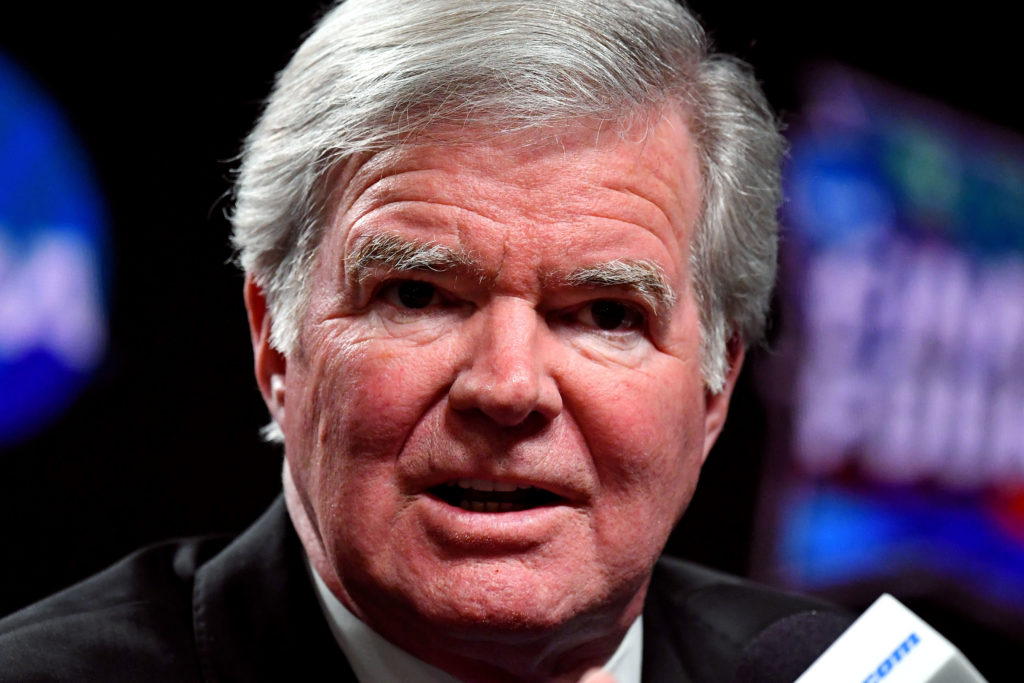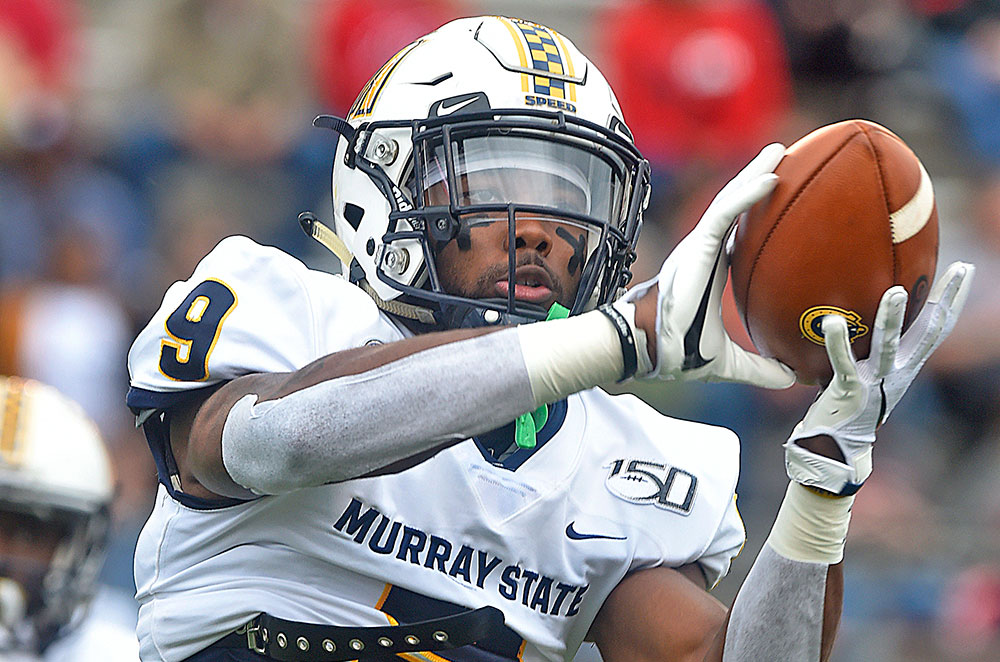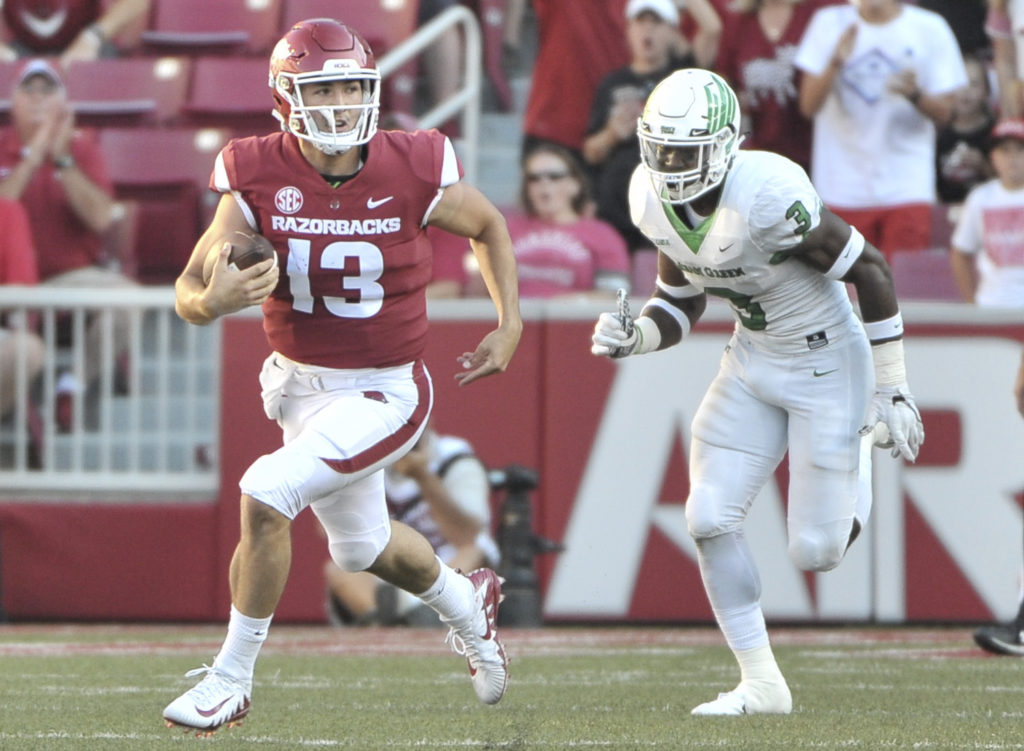Last Chance U recruited athletes disciplined for sex offenses
At least four football players found responsible for sexual misconduct appeared in Season 3.
Nearly three dozen elite college football players descended on a city of 8,600 people in rural southeast Kansas in 2017.
They formed a fearsome squad for Independence Community College where they bulldozed their way to a Jayhawk Conference title for the first time in 30 years.
All that played out on season three of Netflix’s Last Chance U. The documentary series chronicles former NCAA Division I football players who, after losing their first shot in college sports’ highest echelon, transfer to junior colleges in hopes of proving themselves worthy of a second chance.
Many do. Within months of the 2017 football season’s end, 21 Independence players signed with NCAA universities, a press release on the school website said.
Then-head coach Jason Brown won repeated praise — including from himself — for fielding such a star-studded recruiting class.
“I do believe I’m the best recruiter in America,” Brown said while smoking a cigar in a hot tub in episode five. “I’m always gonna go after the best guys, and I’m gonna have ‘em all. I’m kind of a, I don’t know what you want to call it, I’m a prostitute in that regard.”
But while season three of Last Chance U spotlights athletes who got bad grades, busted for marijuana or who came from difficult family situations, it never mentions that several landed at Independence for a more serious reason: They were found responsible for sexual assault.
At least four members of the 2017 Independence roster joined within months of being punished for sexual misconduct at their previous Division I universities, disciplinary records obtained by the USA TODAY Network show. Although not featured as central characters, the four made cameos on the show.
And all four have been recruited to new Division I schools since. They are among at least 33 athletes since 2014 identified in a USA TODAY Network investigation as having transferred to NCAA schools despite being administratively or criminally disciplined for sex offenses at a previous college.
At least 16 of the 33 stopped at junior colleges on their way back to the NCAA from the schools where the sexual offenses took place, the investigation found.
Brown said all four players were vetted and he believes they are innocent, adding that he has turned away others who have sexual misconduct in their backgrounds.
“I would have let them babysit my daughter any day,” he said.
Last Chance U aired its first season in 2016 and is currently producing its fifth season.
The show portrays “JuCo” football as its own form of punishment — a sobering new reality for athletes who’d grown accustomed to celebrity treatment, multi-million-dollar facilities and lavish amenities at top football schools.
On the contrary, athletes use junior colleges to evade sanctions imposed by their previous institutions and the NCAA’s one meaningful penalty — a year of bench time — for those who transfer while suspended or disqualified for disciplinary reasons, the USA TODAY Network investigation found.
The “year of residence” rule requires athletes to sit out for a year if they transfer from one NCAA school directly to another. But by first transferring to a non-NCAA school, such as a junior college, they can avoid that year of no game action.
In junior college, athletes can keep their skills sharp, garner looks from NCAA recruiters and, for those on Last Chance U, get on national TV.
The USA TODAY Network did not identify athletes disciplined for sexual assault in the first two seasons, which took place at East Mississippi Community College. One athlete expelled for sexual assault, Tamarion Johnson, appeared in seasons three and four at Independence.
By highlighting only the feel-good stories and glossing over sexual assault, Last Chance U “glamorizes what these athletes have done,” said Kathy Redmond, a survivor advocate who heads the National Coalition Against Violent Athletes.
“It’s false advertising,” Redmond said. “Netflix spins it like a fairy tale, and it makes you want to cheer for that guy. You think they’re the underdog, not that they’re harming people.”
Even NCAA President Mark Emmert, commenting on the USA TODAY Network investigation during an Aspen Institute symposium, said he was bothered by how easily troubled athletes’ disciplinary records can get overlooked during their junior-college detours.

“I think the most disturbing component of that reporting was that it pointed to individuals that had moved into the community college system and then moved back into the four-year school system,” Emmert said at the Dec. 17 event. “The ability to track that becomes difficult, and some schools, I think, made admissions decisions where they lacked information.”
Athletes fresh off discipline for sexual misconduct sometimes transfer to junior colleges in packs, the USA TODAY Network investigation found.
In 2016, Boise State University expelled two football players and suspended another after a female student reported that they coerced her into performing sexual acts. They transferred to Coffeyville Community College in Kansas the same year, and two of them got recruited back to Division I after a season there.
Michigan State University in 2017 dismissed three football players after a female student said they gang-raped her. In addition to university discipline, they pleaded guilty to felonies and were sentenced to three years of probation and sex-offender treatment in 2018.
All three enrolled at Coahoma Community College in Mississippi the same year, and one got recruited back to Division I this year.
The four Independence players disciplined for sexual offenses followed nearly identical paths.
Without consent

Tamarion Johnson, Dior Johnson and Ray Buford arrived at Independence the same year that the University of Minnesota expelled them for sexual assault, according to disciplinary records obtained by the USA TODAY Network.
The other player, linebacker Tim Faison, came from Purdue University in Indiana, where a female student reported that he raped her in a bathroom at an off-campus house party in December 2015, records obtained by the USA TODAY Network show.
The same student said Faison saw her at a different party roughly two months later, approached her and rubbed her groin area without her consent, records show.
Purdue officials investigated both incidents. They did not hold Faison — who said it was consensual sex — responsible for rape, saying both sides’ accounts were “equally credible.” But they deemed Faison responsible for the second incident and suspended him for one year for violating the school’s anti-harassment policy.

Rather than complete it, he transferred to Independence.
Upon appeal, Faison managed to get his sanction reduced to 10 months of disciplinary probation, counseling and a five-hour educational program about consent.
The Minnesota players unsuccessfully appealed their expulsions around the same time. In that case, a female student had told campus officials in September 2016 that as many as 10 to 20 men raped her in a football player’s bedroom after a game.
A university investigation report published by a local TV station, KTSP, shows that the woman described meeting one Gophers player and a high school recruit for the first time that night. The player brought them to his apartment, and she said it became clear that they wanted sex. She said she felt uncomfortable but complied, believing it was her only way out of the situation.
And then other players began showing up, the report shows.
They cheered, laughed and jostled for a position to have sex with her, she said. One by one, they forced her to perform sexual acts on them, she said.
A university investigator determined that the players lacked credibility. They were reluctant to say who was present in the room, provided contradictory information and deleted pertinent messages and videos, the investigator wrote in her report.
“This suggests some degree of a collective, defensive effort to conceal relevant evidence by the accused students and other members of the football team,” the official wrote.
The investigator recommended discipline for a total of 10 football players — expulsion for five, one-year suspensions for four and probation for one. After the players’ appeals, other school officials decided not to charge five of them and to reduce one’s expulsion to a one-year suspension.
The expulsions for Tamarion Johnson, Dior Johnson, Buford and one other athlete, KiAnte Hardin, remained in place.
Hennepin County Attorney Mike Freeman declined to charge the athletes, citing insufficient evidence. But he released a statement saying that the players’ conduct could “only be described as deplorable behavior.”
Almost all the players sued the university for sex- and race-based discrimination, among other claims, saying that school administrators made examples of them to appear tough on sexual violence. A federal judge earlier this year dismissed their claims with prejudice, meaning they cannot refile the suit.
Hardin transferred to Pittsburg State University, a Division II school in Kansas, where he completed his year of residence before joining the football team for the 2018 season.
The other three headed straight to Independence.
‘Handled it horribly’
Brown, who resigned from Independence in February after texting a German player “I’m your new Hitler,” defended himself and his four recruits in an interview with the USA TODAY Network.
“For me to be questioned about who I bring on my campus is a slap in my face,” said Brown, adding that everyone who knows him knows he respects women. “I’m far from a sexist toad. I had a female athletic director. I have a daughter. I’m not going to allow any of that crazy stuff to go on on my campus.”
Brown said he and other college officials reviewed the University of Minnesota’s investigation report, and that Minnesota “handled it horribly.” Independence’s athletic director and president signed off on the players’ recruitment, Brown said.
Purdue mishandled Faison’s case, too, said Brown, without going into specifics.
“That’s all BS, too,” he said.
Independence did not respond to requests for comment.
Brown said none of the players were criminally charged, and that he did not receive any reports of sexual misconduct against any of his players while at Independence.

Redmond disagreed with Brown. The vast majority of women don’t report sexual assault, she said, and most schools make little effort to alert students about potential predators on campus.
Recent research also indicates that repeat offenders commit the vast majority of campus rapes, Redmond said.
“The fact that he says, ‘Well, we haven’t had a report’ is absolutely ridiculous,” Redmond said. “He needs to look at the recidivism rates. These guys don’t just shut it off.”
Independence finished the 2017 season with a 9-2 record and won its bowl game by a 10-point margin. The perennially bottom-dwelling team celebrated its resurgence on TV and computer screens across the world.
Dior Johnson and Buford played in every game. Faison and Tamarion Johnson both played in all but one.
NCAA bound
In February 2018, three of the four players signed with new Division I schools.
Faison landed at the University of North Texas, Dior Johnson at Murray State University in Kentucky, and Buford at New Mexico State University.
Tamarion Johnson, who goes by TJ now, played a second year at Independence before signing this February with Marshall University in West Virginia.
All four players declined to comment for this story through spokespersons.
Neither North Texas head coach Seth Littrell nor anyone on his staff were aware of Faison’s violation at Purdue, said Senior Associate Athletic Director Eric Capper.
The discipline was not noted on Faison’s transcript or on the “transfer tracer” questionnaire that Purdue filled out on his behalf. The tracer asked only if he’d been dismissed for disciplinary reasons, which he had not been. North Texas did not request Faison’s disciplinary records as part of its vetting process, Capper confirmed.
Marshall Athletics said in a statement that it was fully aware of TJ Johnson’s case at Minnesota and “reviewed all available information.”
“We are comfortable with the information we have gathered, and all of the individuals with whom we have spoken were confident that TJ would represent Marshall Athletics and this university with class. Thus far, that has proven to be the case.”
Murray State declined to comment, saying that federal student privacy laws prohibited it from discussing individual students.
New Mexico State Athletic Director Mario Moccia and head coach Doug Martin agreed to be interviewed about their recruitment of Buford. They were the only ones to do so out of more than five dozen coaches and athletic directors that the USA TODAY Network reached out to during its investigation.
Moccia said it is protocol for such decisions to be made by university administrators, not coaches, though no written policies or procedures dictate how to evaluate such cases. A Title IX official reviewed the investigation reports and decided, along with then-Chancellor Garrey Carruthers and then-general counsel Lizbeth Ellis, that they felt comfortable bringing Buford on campus, Moccia said.
In addition, Buford’s former coaches, including some at Minnesota, gave him high character references, Moccia said. He didn’t believe anyone from New Mexico State attempted to reach out to the victim but couldn’t say with certainty.
“We pass on a lot of situations,” Moccia said. “The ones we go forward with are scrutinized thoroughly.”
Martin said Buford is his first recruit who has been previously disciplined for sexual assault. Martin said he didn’t know the specifics of Buford’s case but that there have been no new complaints involving the athlete.
It is hard for Martin to imagine a scenario in which he would give a second chance to a player he or other university officials thought was guilty of sexual assault, he said, adding that there “would have to be very extenuating circumstances for that to happen.” But universities in general should be more open to providing second opportunities, he said.
“I think in our society today, particularly at the university level, we’re becoming very callous toward giving any young person a second chance,” Martin said. “There are certain situations where if a young man gets a second chance, he can make something really productive out of himself.
“I think that’s where this situation is headed.”